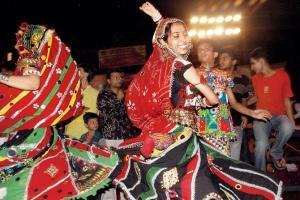Our public discourse increasingly centres around what everyone else is doing, rather than what we choose to do ourselves

Every year, before any major festivity, there are outpourings of anger against those who do not celebrate like we do. file pic
 If you ever make the mistake of spending time on social media platforms when a major festival is underway, you will be treated not to messages of love, community and kindness — the reasons why festivals are supposed to exist in the first place — but outpourings of anger directed towards everyone who doesn't celebrate along with us.
If you ever make the mistake of spending time on social media platforms when a major festival is underway, you will be treated not to messages of love, community and kindness — the reasons why festivals are supposed to exist in the first place — but outpourings of anger directed towards everyone who doesn't celebrate along with us.
ADVERTISEMENT
It happens like clockwork every year, before, during and after Ganeshotsav, for instance, when anyone makes the mistake of questioning why noise, air and water pollution are now mandatory. Why must we all have to shut our windows for 10 days? Why do tonnes of garbage need to be cleared from our water bodies? Why are fish dying in their thousands because idols made of poisonous material are being immersed? Why do the feelings of children, senior citizens not matter? These are questions that cannot be asked by anyone, because to do so is to invite the wrath of troll armies. To ask such questions is now tantamount to treason.
Empowered by political parties, fuelled by communal hate, often followed by the Prime Minister of India, these bands of roving grammatically-challenged warriors pounce upon hapless souls who dare to ask questions that, in any sane country, would be looked upon as completely valid. What they get instead are not answers, but insults, abuse, and counter questions on why other festivals aren't being targeted.
If we have to praise our God without the help of a DJ, why should other communities be allowed to communicate with the help of a loudspeaker? If we are asked to avoid blocking the streets for days at a stretch, why shouldn't other communities be asked to pray indoors instead of outdoors? If the high court wants to stop us from celebrating our festivals the way we want to, why doesn't the high court ask everyone else to behave during their own festivals too?
Our politicians take these cues to heart, naturally, because if there's ever any reason to bypass common sense and do the right thing, you can always count on a politician to embrace it. And so, questions about corruption are answered not with explanations but with counter questions. The acts of previous governments are paraded to justify current policies. Dearly departed leaders are trotted out regularly to take the blame for choices made by the living. It's never us, always them.
What this betrays is a common failing among us all — an inability to take responsibility for our actions. It explains our desperate scramble for scapegoats whenever something we do goes awry. It is always someone else's fault and, if it isn't, it should be. If given the choice between introspection and deflection, we inadvertently choose the latter, which probably explains why our foreign policy also deteriorates into finger pointing rather than decisive measures.
Another thing our festivals bring to the fore is our unquestioning acceptance of the past. We place tradition before common sense, insist on practices that were put into place for a different time without taking into account how our cities and towns have changed. It's why women still have to go to court for permission to enter places of worship, and why judges need to stop focusing on serious crimes to issue proclamations on how loud we should be instead.
The voices of sanity are few and more far between than ever before, as young Indians no longer remember a time when our festivals were occasions of spirituality and meditation. They have been born and raised in an environment of consumerism instead, where gifts matter more than the reasons why our festivals came into being in the first place.
I remember a time when festivals really were joyous occasions. There used to be something in the air, and it wasn't chemicals or the sound of item numbers. Our sense of community has slowly eroded, even as our emphasis on the spiritual has taken a backseat to the material and political. It's no accident that our festivals are now sponsored and celebrated not by people like us, but by politicians who choose to use them as tools to capture vote banks. They are now the ones offering prizes, paying for hoardings and sound systems, encouraging the rest of us to focus less on God and more on displaying our devotion in public.
What we lose isn't just our sense of community, unfortunately. What we lose, in this crass emphasis on publicity, is our connection with our Gods, Goddesses and our respective faiths.
When he isn't ranting about all things Mumbai, Lindsay Pereira can be almost sweet. He tweets @lindsaypereira Send your feedback to mailbag@mid-day.com
Catch up on all the latest Mumbai news, crime news, current affairs, and also a complete guide on Mumbai from food to things to do and events across the city here. Also download the new mid-day Android and iOS apps to get latest updates
 Subscribe today by clicking the link and stay updated with the latest news!" Click here!
Subscribe today by clicking the link and stay updated with the latest news!" Click here!







